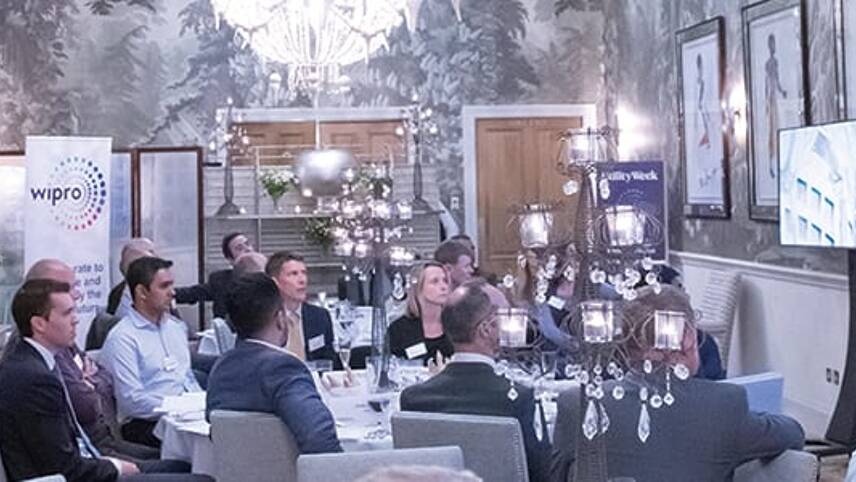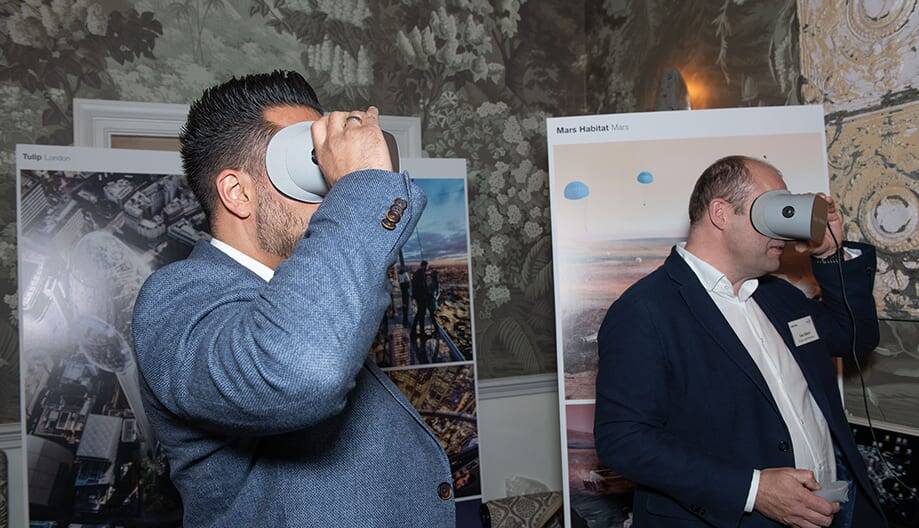This is the Sponsored paywall logged out

Members of Utility Week’s Technology and Innovation Council have been busy. Jane Gray reviews two council events centring on the future of switching and utility responses to the climate crisis.
 With utilities under increasing pressure to innovate and leverage transformative technologies, the forum provided by Utility Week’s Technology and Innovation Council, hosted in association with Wipro, is in hot demand. Here we review two recent council meetings and the insights they generated.
With utilities under increasing pressure to innovate and leverage transformative technologies, the forum provided by Utility Week’s Technology and Innovation Council, hosted in association with Wipro, is in hot demand. Here we review two recent council meetings and the insights they generated.
Imagine: better switching
For better or worse, the volume and efficiency of switching continue to dominate a heated debate about consumer engagement in the UK energy market.
Energy UK’s latest figures tell a good news story about switching on the rise – more than two million switches have taken place so far this year, a rise of almost 20 per cent on the same point in 2018, which was itself a record.
But such figures continue to reflect the frenetic switching activity of an engaged minority of the domestic market. Furthermore, while the vast majority of requested switches are completed without mishap, suppliers will know all too well that the immensely convoluted industry processes behind a change of supplier can easily go wrong and result in some significant instances of consumer frustration, anger and upset.
With switching under scrutiny from the regulator and government, and customer trust in suppliers at a low ebb, these cases are high impact and serve to compound the negative profile the energy retail sector as a whole has with the public.
It was with this challenge in mind that a group of energy retail representatives, consumer advocates and regulators, met to take part in a mini-sprint event, hosted by Utility Week in association with global technology consultancy Wipro. The ambition behind the event was to bring industry knowledge together for a fast-paced ideation session, focused on sparking solutions to key switching process and experience challenges.
Ahead of the event, participants were asked to submit a list of their most keenly felt pain points when it came to completing change of supply requests to a high level of customer satisfaction.
Submissions raised a number of common issues, especially around creating customer confidence in the value of their switch, promoting customer understanding about the likely impact on direct debits following a tariff change, and around key industry data issues like MPAN-address mismatches which can lead to customer experience fiascos – for instance the wrong customer’s supply being switched.
Perhaps the most dominant pain points however, and the challenge which event participants chose to tackle, were around settlement of the final bill. Multiple participants listed a range of customer experience problems in this area, ranging from late final bills and uncertainty about credit/debit balances to shock-bill fear and the impact of unexpected final bills on customers with very specific budgeting constraints.
Bundling together all these concerns with the final bill, Utility Week issued a challenge to the sprint group to imagine how a process might be created that could switch an account and resolve any outstanding payment issues in a single transaction.
The process
Using a range of design sprint and ideation tools, two competing teams of event participants worked to create a potential solution to this challenge. Working independently, each team came at the challenge from significantly different angles and landed on widely contrasting solutions.
One team generated a solution that also addressed wider consumer confidence challenges in the market. It was based on the creation of a pre-switch validation platform, which would allow customers to verify their usage data and simulate likely bills under different tariff options. The team suggested that the “midata in energy” project led by Ofgem and the Department for Energy and Industrial Strategy could be leveraged to make the solution work.
It was the second team’s solution, however, that was ultimately judged to posit the most viable and targeted solution to the core challenge – how might we switch and account and resolve any payment issues in a single transaction?
Their solution aimed to create a seamless customer transition between suppliers that would involve no final bill at all. This relied on bilateral working between the incumbent and new supplier to transfer credit balances and resolve debt behind the scenes.
While the team behind the solution recognised there would be challenges in implementing such a process – not least cash flow issues for suppliers – the ambition to eliminate the need for a final bill from the switching process was an exciting one for the group. One event participant also suggested that the solution could be automated using a blockchain-style technology, thereby removing potential challenges around the management of manifold bilateral agreements in the market.
The event ended with strong positive feedback from participants on the opportunity it had afforded to think in a targeted way about a specific switching problem. It was clear from group discussion and submitted pain point information that resolving final billing issues could significantly alter customer perceptions of switching and ease anxiety about unexpected negative impacts. Arguably, this problem area should become a focus for regulator-run switching improvement programmes, which have been dominated to date by a drive for faster switching.
TI Council 2019
The future switching sprint event was followed by the first 2019 meeting of the Technology and Innovation Council, a joint initiative run by Utility Week and Wipro to foster fresh thinking and the adoption of transformative new technologies in the utilities sector.
The meeting featured a special guest presentation from senior leaders at architectural engineering firm Foster and Partners who spoke to the group about the importance of “human-centric” design in the built environment – especially in response to the macro trends of population growth and urbanisation.
Among a range of insights into unique architectural projects, including design and delivery of Apple Park – the tech giant’s new California headquarters – the presentation showed how data on the stress levels experienced by individuals in different surroundings is being leveraged by Foster and Partners, with the help of advanced analytics, to create award-winning sustainable spaces that are able to prompt and harness useful behaviours from their inhabitants. In work places, this included delivering tangible boosts to workforce productivity.
In light of the changing face of the utilities industry and the growing demand to harness customer behaviours in order to overcome key industry and societal challenges, council members said this “human-centric” design concept provided a timely challenge to the traditional engineering mentalities still dominant in most of their companies.
The Foster and Partners presentation also included insights into the work the firm is doing to design smart homes, cities and electric vehicle charging infrastructure, prompting a number of dinner attendees to admit there is a need for utilities to “think bigger” about the collaborative partnerships they are seeking in future energy system innovation schemes.
Other key topics discussed over the course of dinner included the net zero emissions challenge laid down by the Committee on Climate Change and the innovation impetus this ought to give the sector. Some concerns were raised as to whether the sector’s traditionally low-risk investors might put limitations on the ambition and vigour with which utilities approach environmentally driven innovation. But overall optimism won out, suggesting that investors increasingly recognised innovation for environmental sustainability as far lower risk than a failure to recognise the threat posed by climate change.
Beyond investor influence, a key concern was that the remit of utility regulators – for both energy and water – is not sufficiently aligned to facilitating decarbonisation or environmental stewardship. Since the council met, both regulators have outline plans to review their relationship with the climate change challenge and the way in which it should influence their regulatory strategies and toolkits.
The sprint challenge:
How might we… switch an account and resolve any payment issues in the same transaction?
Associated pain points (submitted by industry participants in advance of the event):
• Late final bills;
• Inaccurate final and/or first bills;
• Customer uncertain of credit balance;
• Customer uncertainty about when/if any credit will be refunded after a switch;
• Lack of customer awareness about the need to pay off outstanding debt with old supplier following a switch;
• Lack of clarity about exactly when a final bill will land (can be problematic for customers with specific budgeting needs);
• Mistrust of final bill accuracy from old supplier;
• Switch objections being raised in error due to incorrect debt records or direct debit calculations on part of the supplier.
Wipro council
The Utility Week-Wipro Technology and Innovation Council originally launched in 2015 with the ambition of providing a regular forum for ideas sharing and inspiration for utilities professionals with responsibility for technology uptake and innovation.
Since then, the council has become widely recognised in the industry, regularly bringing together leading innovators and technology experts from across the energy and water sectors. Their guidance and insight has also led to the publication of a series of bespoke research reports, each uncovering valuable insights into the priorities and challenges faced by those attempting to create the utilities of tomorrow.
The next Utility Week-Wipro Technology and Innovation Council event is due to take place in November. For more details, please contact: LizIzard@fav-house.com.

Please login or Register to leave a comment.